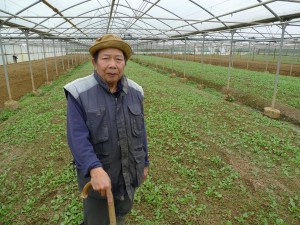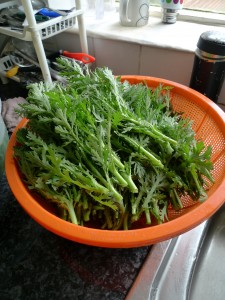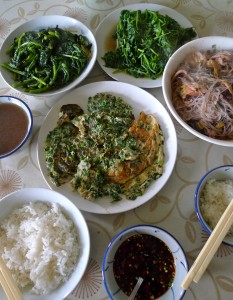Chinese vegetables grown in Kent
 You can read my piece about Farmer Mau Chiping in today’s Financial Times magazine. For years I’ve been torn between my desires to buy as much local produce as possible and to cook as much Chinese food as possible. With meat and poultry, it’s fairly easy – try red-braising pork from the Ginger Pig! But the supply of locally grown Chinese vegetables has always been limited. That’s why I was so thrilled to discover the tiny shop just opposite Pang’s Printing Press, in an alley off Macclesfield Street in London’s Chinatown. It’s a small Chinese provisioners, selling basic seasonings, noodles and so on, but also vegetables from Mau Chiping’s farm in Kent. The choy sum and gai lan are glorious, as are the mustard greens, pak choy, water spinach and occasional treats such as stem lettuce (celtuce) and Chinese garlic chives. The farm is not certified organic, but mainly
You can read my piece about Farmer Mau Chiping in today’s Financial Times magazine. For years I’ve been torn between my desires to buy as much local produce as possible and to cook as much Chinese food as possible. With meat and poultry, it’s fairly easy – try red-braising pork from the Ginger Pig! But the supply of locally grown Chinese vegetables has always been limited. That’s why I was so thrilled to discover the tiny shop just opposite Pang’s Printing Press, in an alley off Macclesfield Street in London’s Chinatown. It’s a small Chinese provisioners, selling basic seasonings, noodles and so on, but also vegetables from Mau Chiping’s farm in Kent. The choy sum and gai lan are glorious, as are the mustard greens, pak choy, water spinach and occasional treats such as stem lettuce (celtuce) and Chinese garlic chives. The farm is not certified organic, but mainly
fertilised with chicken and horse manure, and Mau says he uses pesticides only in extremis (the weeds and wildflowers infiltrating his vegetable beds lend support to this assurance). Since I found this shop, I’ve been buying a large proportion of my everyday greens there.
Mau Chiping, now in his seventies, grew up in a Hakka family in rural Guangdong Province, and won a coveted place at medical school in the provincial capital, Guangzhou. But although a promising career as a doctor might have beckoned, he was the grandson of a landlord, which made him a easy target for Maoist persecution. In 1959, the first year of China’s great famine, he secured permission to visit his father, who had already fled to Hong Kong. ‘My father wept at the thought that I might return to China after my stay,’ he says. ‘It was the only time I ever saw my father cry. I couldn’t leave him.’ So Mau stayed in Hong Kong, working as a vet until he obtained a work permit for Britain in 1974. After emigrating with his wife and four children, Mau worked in a Chinese restaurant while learning English in his spare time (he says he spent a quarter of his salary on English classes, and stayed up late after service to do his homework while his colleagues played mahjong). Eventually, in 1980, he bought two acres of farmland near Tonbridge with a bank loan, and learnet the basics of agriculture from another Chinese farmer. Originally, he and his wife owned the Chinatown shop, but these days they are just one of its suppliers.
Please be aware that the shop also stocks some imported Chinese vegetables. The imported vegetables are normally displayed in polystyrene boxes, while the Kent produce is displayed in wooden pallets at the back.



2 Responses to “Chinese vegetables grown in Kent”
I’s amazing!!Didn’t know Chinese vegs have been grown in the UK for so long….
Oh, this is lovely, both to learn about the personal history of a producer (which I always enjoy, I don’t know whether that’s just the nosy parker in me) and also to know about the shop, which is easy for me to get to.
Thanks for sharing this!